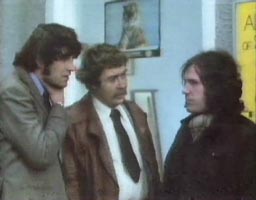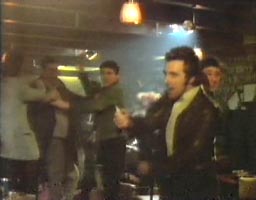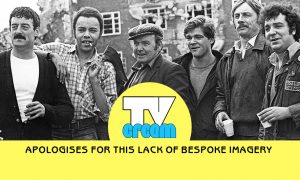A Thursday night in a Greenock pub, and as revellers drink to the beat of punk outfit The Cuban Heels knocking out a rickety version of Paint It Black, Jake McQuillan (Frankie Miller) and pal Dancer Dunnichy (Ken ‘Murphy’s Mob’ Hutchison) find themselves drawn into a brawl. Jake, a noted local hard man, is trying to move away from such pointless aggro (as the barman remarks, ‘I thought you’d given up the games?’) but when Dunky McAfferty (Billy ‘That Sinking Feeling’ Greenlees)’s gang unsheath their chibs and start wantonly slashing the faces of punters, he’s been provoked enough. The ensuing fight takes over the entire pub, and Jake arms himself with a bottle as the staff batten down the bar grilles. The police eventually arrive – a discreet few minutes after it’s all cooled off, of course – and the (largely) innocent Jake is fingered by them as the instigator purely on his rep.
Jake makes his way back home, to his grandparents, morose Jean ‘Orkney’ Taylor Smith and cadaverous, tubercular Grandad (legendary Edinburgh comic Hector Nichol). Grannie’s worn down through worry, and there’s no love lost between Frankie and his grandad, in his day a hard man himself of some rep, who scowls at both of them when he’s not helplessly coughing his guts up (literally). Friday morning, Dancer wakes up to his wife (Katherine Stark) beating him about the head and demanding to know where the hell he was until five this morning. Calmly opening a tin of lager, he smooths things over with her – after a fashion – and, as their three kids bolt into the front room to turn on all domestic appliances for an invigorating pre-school blend of Johnny Cash on the radio and Open University quantum mechanics on the telly, Dancer gives himself the day off work, and cunningly hides what bread is left in the house about his person as an excuse to go out to the shop.
His plan working, he skips down the street like a schoolboy during a teacher’s strike, blagging a bottle of Vat 69 from the unopened offie, on the way to rendezvous Jake at the docks. It doesn’t take long in the cab of Jake’s crane, to persuade him that a long weekend is preferable to unloading containers and heating toast on the element. With a nod from the foreman that’s surprisingly easy to obtain (as was Dancer’s wife’s agreement to phone him in sick – whatever work ethic there once was in these parts has long departed) Jake and Dancer head off in a torrential downpour to the barren estate which is home to Bella (Jan Wilson), a middle-aged woman who entertains the pair in her clarty flat for half a bottle of fortified wine.
After Jake nearly sets fire to the house while lighting the bricket, Dancer makes it clear he’s there for more than a, well, dance, and Jake reluctantly goes outside, to be challenged by some kids over the previous night’s altercation with McAfferty. Smacking one of the boys in the head, and getting no reprisals from anyone, Jake walks away, slightly apprehensive at what seems to be brewing. Nearby is the flat of Jake’s estranged mum, outside which he pauses, watching her Hoovering, but resists the temptation to call. The pair collect their ebullient chum Tanza (Gregor Fisher) from his garage prior to the evening’s entertainments. A phone call from home – Grandad’s at death’s door – merely spurs Jake on to go to town more.
A match in a quiet snooker hall is disrupted when the kids from earlier follow them in and eye them up. Taking the same boy he lamped earlier aside in the lavs, Jake reduces him to a pitiful, quivering wreck merely by staring him out. Finally, as the three leave the snooker hall, they’re set upon by McAfferty’s gang, and the ensuing punch-up, ranging round the nocturnal crates of the docks, makes the pub barney look like a schoolgirl slap-up. Jake manages to best McAfferty and Tanza looks after himself, but the less able Dancer loses an eye, runs pell mell into a throat-high mooring cable and tumbles into the dock, dead. Tanza grieves at the loss, but Jake remains as impassive as he’s always been. ‘It’s just part of the Game,’ he says, trying more to reassure himself than Tanza.
Back home, Grandad’s in his final minutes. The presence of various long-lost relatives, including mum, is heralded by Jake with a curt ‘What do you want?’ There’s to be no tearful reunion at this wake. Gran, still resigned even though her husband’s called her by her name for the first time in over thirty years, calls Jake in to see the old man. Jake decides to make his peace, forgiving Grandad for the contemptuously shabby treatement he’s meted out to Gran, himself and the rest of the shattered family. The old boy chokes some air into his lungs, and summons a last ounce of strength to respond: ‘I’ve… I’ve ne’er been fond o’ you. And in my day, I could’ve taken ye any time.’ Close in on Jake’s ever-impassive eyes as the closing song (sung by Miller) plays out.
What makes this fantastic entry work so well is writer Peter McDougall’s firm grasp of the rough milieu it depicts. Aside from the slovenly coppers, there’s no finger-wagging at any outside authority here, it’s almost straight reportage of the impossibility of rising from the bottom of the urban heap, the endless cycle of despondency and despair, with only the crutch of cheap wine and the status of the brawler to leaven the funereal monotony.
Humour is here throughout the pain, not in a judgemental, mocking sense on behalf of the makers, or as wisecracks for their own sake, but a defence mechanism, showing the lads to be every bit as aware of what the suburban viewer would find ‘gahstly’ about their life, but still, if not able to change it significantly, than at least capable of shouldering it to one side for a moment. As Dancer appears after the pub fight with a bottle of whisky and twelve lagers, Tanza muses ‘Well, that’ll dae us for the bus.’ Of the rain-sodden concrete housing estate, Dancer remarks ‘I can remember this before they landscaped it.’ Tanza’s wayward choice of apparel is highlighted with: ‘Did you cover your body in glue and jump through a wardrobe?’
And the end gag – for all its tragic punch, it’s still a gag, undercutting the expectation of a traditional deathbed reconciliation with majestic aplomb – is one of the most grimly powerful of any piece of drama. The performances are imbued with the same stock of first-hand knowledge as McDougall’s script. Hutchison and Fisher, the latter close to the very start of his acting career, are marvellous, and Miller, better known at the time for his songwriting, inhabits the intense-yet-poker-faced Jake in a way it’s unlikely any trained actor would be able to.
McDougall’s Play for Today partner John MacKenzie directs at perfect pitch, drinking in the sozzled and grimy locations without trying to overstate his case with excessive focus on economic deprivation, and getting the most out of the intense face-to-face encounters when the words stop. And no-one can choreograph and film a ruck like MacKenzie. Despairing, defiant, compassionate but free from the empty calories of textbook polemic and hand-wringing sentiment, Just a Boy’s Game belongs firmly among the top entries of the Play for Today canon.
 |
 |



















